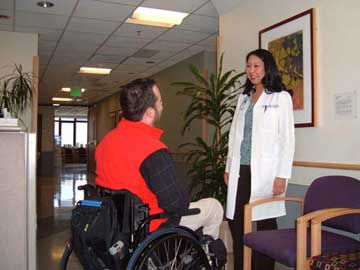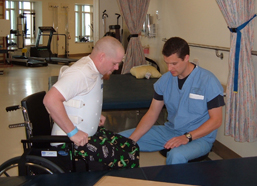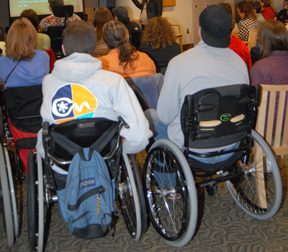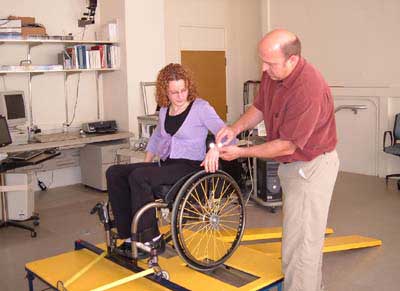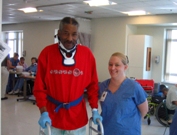Spinal Cord Injury Update
Winter 2012: Volume 21, Number 1
Funding Renewed for UW's Spinal Cord Injury Model System
Contents
The Northwest Regional Spinal Cord Injury System (NWRSCIS) in the University of Washington (UW) Department of Rehabilitation Medicine has been awarded a $2.3 million grant from the National Institute on Disability and Rehabilitation Research (NIDRR) to continue for another five years as one of only 14 Spinal Cord Injury Model Systems in the country.
Model system grants are awarded to institutions that are national leaders in SCI research and patient care and serve a high volume of SCI patients. The award recognizes the excellence of our faculty and staff in providing a comprehensive, integrated continuum of pre-hospital, medical, surgical, and rehabilitation services and in conducting rigorous, innovative research that improves the lives of persons with SCI. The NWRSCIS has been in the SCI Model System program for 37 years and serves Washington, Idaho, Montana and Alaska—by far the largest geographic area of any model system in the country.
“This grant will allow us to continue our partnership with the Consumer Advisory Board and all the related activities such as the SCI Forums, SCI Update newsletter, our website, videos and the peer mentoring program,” says Charles Bombardier, PhD, principal investigator and director of the NWRSCIS and a professor and clinical psychologist in the UW Department of Rehabilitation Medicine. “In addition, with this grant we will test a novel approach to improving the capacity of our outpatient clinics to assist people who have persistent pain, people who want to become more active and people who suffer from depression.” Bombardier has 23 years’ experience in SCI clinical care and research, including 15 years as a NWRSCIS investigator. Other UW Rehabilitation Medicine faculty on the grant are co-directors Stephen Burns, MD and Jeanne Hoffman, PhD, and co-investigators Rina Reyes, MD and Dawn Ehde, PhD.
Since its beginning in 1973, the mission of the NWRSCIS has been to improve the lives of people with SCI through excellent patient care, research and education.
Patient Care
Beginning with pre-hospital care that includes Medic One and Airlift Northwest, lifesaving emergency medical services are delivered to injured persons throughout Washington, Idaho, Montana and Alaska. Once people are transported to Harborview, the region’s only Level 1 trauma center, experts in neurological surgery, orthopedic surgery, general surgery, neurology/emergency medicine, pulmonary medicine, plastic surgery and rehabilitation medicine combine in multidisciplinary teams to provide care tailored to the specific type of injury and the individual needs of the patient.
Our inpatient rehabilitation program at the UW and Harborview Medical Centers is rated the #1 hospital-based rehabilitation program in the nation by US News and World Report. Our outpatient rehabilitation clinics provide the full complement of rehabilitation therapies and medical services for SCI-related conditions. Our rehabilitation team includes rehabilitation physicians, nurses, physical and occupational therapists, speech pathologists, recreation therapists, social workers, vocational rehabilitation counselors, psychologists and neuropsychologists.
In addition, our centers provide specialized services in the areas of assistive technology, adaptive driving, wheelchair seating, pain management, fertility, bladder management, spasticity management, functional electrical stimulation (FES) and body-weight supported therapy.
Research Activities
Our model system funding from NIDRR supports three types of research activities:
1. National Spinal Cord Injury Model System Database
All the model system centers contribute information about their SCI patients to a national database in order to learn more about the causes and long-term consequences of SCI. Newly injured patients are invited to participate in this study, and those who agree are contacted periodically over the years to answer questionnaires. To protect patient privacy, identifying information is not provided to the national database.
Since 1973, more than 27,000 people have provided information for the database. This information is used by researchers throughout the country to improve care for persons with SCI. The database is coordinated by the National SCI Statistical Center, which publishes annual reports describing types of injuries, characteristics of those who are injured, medical complications, use of health services, life expectancy, lifetime costs of care, and many other facts. These reports are available to the public at https://www.nscisc.uab.edu/.
2. Site-specific SCI Study
Each model system conducts its own local or “site-specific” study over the five-year grant period. Our study is called “Efficacy of collaborative care versus usual care for improving quality of life in outpatient spinal cord injury rehabilitation: A patient-centered approach.” It was developed in response to input from our Consumer Advisory Board, consumer surveys and previous research at our institution and around the country. Chronic pain, depression and difficulty being physically active are common problems for many people with SCI that have a negative effect on overall quality of life. These problems are also very complex and difficult to treat in the current health care system.
Our study aims to improve treatment for these conditions by testing a new collaborative care approach. It is a 16-week, single-blind, randomized controlled trial comparing collaborative care to usual care for improving physical activity, chronic pain and depression. In this model, a specially trained care manager works with the patient and his or her rehabilitation physician and a team of expert advisors to enhance outpatient healthcare delivery. This method has been found to work well with patients who have chronic conditions such as diabetes and heart disease.
Study participants will be invited to participate from the outpatient rehabilitation clinics at Harborview and UW Medical Centers. We expect to begin enrollment in the study in March 2012. For more information contact the Research Coordinator at 206-616-8568.
3. Multi-Site Study
The NWRSCIS is joining seven other model systems on a study called “Assistive Technology and Equity” that will explore the wheelchair equipment and services provided to individuals with SCI of different ethnic, economic and social backgrounds. The goal is to improve wheelchair services for all individuals with SCI and, as a consequence, improve overall health and participation in life. This study is directed by Michael Boninger, MD, director of the University of Pittsburgh Model Center on Spinal Cord Injury. Participants for this study will be drawn from individuals who are already enrolled in the National SCI Model System Database through their participating model systems and have been injured for more than one year. The study is expected to start in spring of 2012.
Education, Information & Support
The NWRSCIS will continue to offer programs that help individuals with SCI and their family members and health providers stay current with SCI information, treatments and resources.
-
Website: http://sci.washington.edu/
Our website contains articles, newsletters, videos, patient education pamphlets and research publications produced by our model system. Content is added and updated continually, and subscribers to our email newsletter also receive notices whenever new information is posted. Become an email subscriber at http://sci.washington.edu/info/subscribe.asp.
-
SCI Forums and Videos
Our speaker and discussion series is held eight times a year at the UW and covers a wide variety of topics related to living with SCI. Forums also serve as an informal social gathering place where people with SCI can meet, network and support each other.
Forums are videotaped and posted on our website as streaming video at http://sci.washington.edu/info/forums/forum_videos.asp.
Learn about upcoming SCI Forums and subscribe to the SCI Forum flyer at http://sci.washington.edu/info/forums
-
SCI Update Newsletter
The newsletter you are reading right now, SCI Update, is published three times a year in print and on our website. Read online or subscribe at http://sci.washington.edu/info/newsletters.
-
SCI Patient Education Brochures
Staying Healthy after a Spinal Cord Injury is a series of 10 brochures providing self-care information about skin care, bladder and bowel management, pain and depression after SCI. Read or download at http://sci.washington.edu/info/pamphlets.
-
Peer Mentoring
After a traumatic event such as SCI, it often helps to talk to someone who has been through a similar experience (a “peer”) and has made a successful adjustment to SCI. This program matches newly injured SCI patients in our rehabilitation units at Harborview and UW Medical Centers with peer mentors based on gender, age, injury level, function and life circumstances.
-
Support & Information Group
Individuals with SCI and their family members and caregivers are invited to monthly meetings at Harborview Medical Center to share stories, ask questions and get real life answers from each other. For information, visit http://sci.washington.edu/info/sig.asp.
Our Team
-
Faculty and Staff
- Charles Bombardier, PhD, Project Director
- Stephen Burns, MD, Medical Co-Director
- Jeanne Hoffman, PhD, Psychosocial Co-Director
- Rina Reyes, MD, Co-investigator
- Dawn Ehde, PhD, Co-investigator
- Chris Garbaccio, BA, Research and Peer Mentor Coordinator
- Hai Yen Nguyen, BS, Research Assistant
- Melissa Takahashi, BS, Research Assistant
- Cynthia Salzman, MHA, Public Information Specialist
-
Consumer Advisory Board (CAB)
An advisory board of individuals with SCI, family members and health care professionals meets regularly throughout the year to provide guidance and feedback about our programs and research efforts. The CAB helps keep us tuned in to the needs and concerns of people with SCI living in our community.

